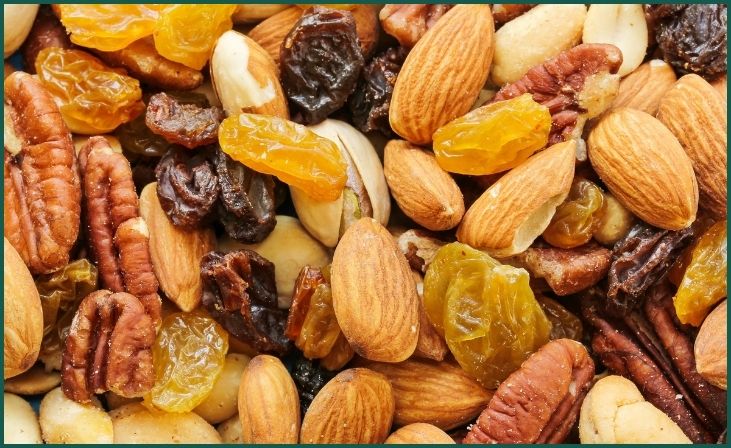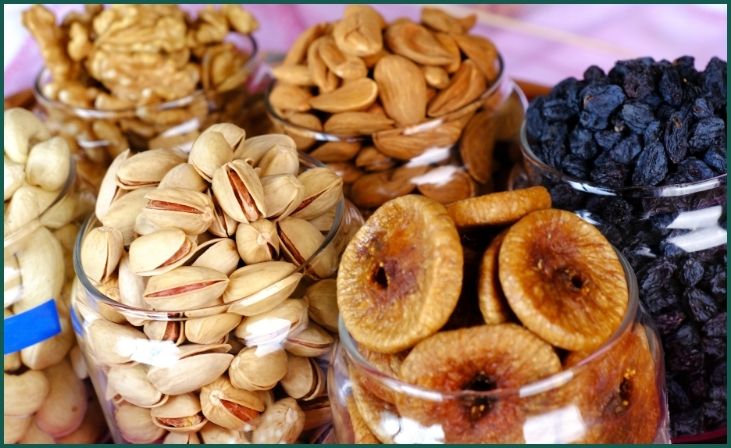As the health-conscious movement gains momentum, dry fruits have emerged as a popular choice for snacking. Renowned for their nutritional richness, including vitamins, minerals, and fiber, they’ve become synonymous with wholesome eating. However, despite their benefits, excessive consumption of dry fruits can trigger a range of adverse effects. This article delves into 10 such side effects, shedding light on the importance of moderation in enjoying these nutritious treats. By understanding the potential drawbacks of overindulgence and adopting balanced consumption habits, individuals can harness the benefits of dry fruits while mitigating the risks to their health and well-being.
Table of Contents
ToggleEffect Of Overeating Dry Fruits
Weight Gain

Dry fruits are packed with essential nutrients, making them a popular choice for healthy snacking. However, it’s crucial to recognize that they are also calorie-dense. Overindulging in dry fruits can lead to an unintended surplus of calories, ultimately contributing to weight gain. What’s more, many dry fruits naturally contain sugars, which can escalate caloric intake when consumed excessively.
Raisins, for instance, are concentrated sources of sugar, easily leading to a calorie overload if consumed in large amounts. Thus, portion control is paramount when incorporating dry fruits into your diet. Being mindful of serving sizes helps to reap the nutritional benefits of these snacks without inadvertently consuming excessive calories, thereby maintaining a healthy weight and promoting overall well-being.
Read Also: 8 Foods That Speed Up Your Body’s Aging Process
Digestive Issues
While dry fruits are renowned for their fiber content, excessive consumption can backfire on digestive health. Although fiber aids digestion, overdoing it may trigger discomforts like bloating, gas, and abdominal pain. Dry fruits, like prunes and figs, are particularly high in fiber, which, when consumed in excess, can overwhelm the digestive system.
Moreover, insufficient water intake compounds these issues, as fiber requires ample hydration to move smoothly through the digestive tract. Without proper fluid intake, dry fruits may exacerbate symptoms of digestive distress. Therefore, it’s crucial to strike a balance between fiber consumption and hydration. Moderation in dry fruit intake coupled with adequate water intake ensures optimal digestion, minimizing discomfort and promoting gastrointestinal well-being.
Blood Sugar Spikes

Despite being perceived as healthier alternatives due to their natural sugar content, dry fruits can still lead to spikes in blood sugar levels, especially when consumed excessively. This poses a particular concern for individuals with diabetes or those predisposed to the condition. Sweet varieties like raisins, dates, and figs have higher sugar concentrations, which can elevate blood glucose levels rapidly.
To manage this, individuals with diabetes need to monitor portion sizes and choose dry fruits wisely. Pairing them with protein or healthy fats can slow down the absorption of sugars into the bloodstream, thus mitigating their impact on blood sugar levels. By being mindful of their intake and making strategic food choices, individuals can enjoy the nutritional benefits of dry fruits without compromising their blood sugar control.
Dental Problems
Dry fruits, with their sticky texture and natural sugars, pose a risk to dental health if not consumed with caution. The sugars in dry fruits can cling to the teeth, providing a feeding ground for bacteria and promoting tooth decay. Overindulging in dry fruits without following up with proper oral hygiene measures like brushing or rinsing can heighten this risk, potentially leading to cavities and other dental issues.
To safeguard oral health, it’s crucial to incorporate dry fruits as part of a balanced diet and prioritize good dental hygiene practices. By maintaining regular brushing and flossing routines and being mindful of the frequency and quantity of dry fruit consumption, individuals can mitigate the risk of dental problems and enjoy the nutritional benefits these snacks offer.
Don't just scroll, subscribe!
BuzzTrail's unique web-stories are the cure for boredom you've been waiting for.
Nutrient Imbalance

Dry fruits offer a plethora of vitamins and minerals, but overindulgence can upset the balance of nutrients in one’s diet. Consuming large quantities of certain dry fruits may lead to an excessive intake of specific nutrients, potentially overshadowing the consumption of others. For instance, focusing solely on almonds for their vitamin E content might neglect the intake of other essential nutrients present in different dry fruits.
Diversifying the diet is key to maintaining a balanced nutrient profile. By incorporating a variety of foods, individuals can ensure they receive a wide array of vitamins and minerals, mitigating the risk of deficiencies or imbalances and promoting overall health and well-being.
Allergic Reactions
Some people may be allergic to certain types of dry fruits, such as nuts or sulfite-containing fruits like dried apricots. Overeating these allergenic dry fruits can trigger allergic reactions ranging from mild itching and hives to more severe symptoms like difficulty breathing and anaphylaxis. Individuals with known food allergies should carefully read labels and avoid consuming dry fruits that may trigger allergic responses.
Gastrointestinal Discomfort

Some dry fruits, such as dried apricots and prunes, are rich in sulfur compounds, which can induce gastrointestinal distress, including diarrhea if consumed excessively. These compounds possess natural laxative properties that can lead to bowel irregularities and discomfort in susceptible individuals.
Maintaining moderation in dry fruit consumption is crucial to prevent such gastrointestinal issues. By limiting intake and being mindful of individual tolerance levels, one can avoid the discomfort and disruption to digestive health associated with overindulgence in sulfur-rich dry fruits. Balancing the consumption of these fruits with other fiber sources and staying hydrated can also help alleviate potential gastrointestinal discomfort.
Elevated Cholesterol Levels
While dry fruits are generally considered heart-healthy due to their unsaturated fat content, overconsumption can contribute to elevated cholesterol levels, especially in individuals predisposed to hypercholesterolemia. Some dry fruits like cashews and almonds are high in monounsaturated fats, which, when consumed excessively, can raise LDL cholesterol levels. It’s important to enjoy dry fruits in moderation as part of a balanced diet to maintain optimal cholesterol levels.
Potential Toxicity

Certain varieties of dry fruits, particularly imported ones, may contain sulfites or other preservatives to enhance shelf life and appearance. Overconsumption of sulfite-containing dry fruits can lead to adverse reactions in sensitive individuals, including headaches, nausea, and respiratory problems. Choosing organic or sulfite-free options and limiting intake can help reduce the risk of toxicity associated with these additives.
Read Also: 6 Ways to Restore Healthy Gut Flora Easily
Financial Strain
Dry fruits, especially premium varieties like nuts and exotic fruits, can be expensive compared to other snacks. Overeating these costly treats can strain the budget, especially if consumed in large quantities regularly. It’s important to strike a balance between enjoying the nutritional benefits of dry fruits and managing expenses to maintain financial well-being.
Bottom Line
In conclusion, while dry fruits offer numerous health benefits when consumed in moderation, overeating them can lead to various side effects ranging from weight gain and digestive issues to dental problems and allergic reactions. By practicing portion control, diversifying the diet, and being mindful of individual sensitivities, individuals can enjoy the nutritional goodness of dry fruits without experiencing adverse effects. As with any food, moderation is key to reaping the benefits of dry fruits while minimizing potential risks to health and well-being.
FAQs
Are all dry fruits equally nutritious?
Are all dry fruits equally nutritious?
No, the nutritional content varies among different types of dry fruits. Some may be higher in certain vitamins or minerals than others.
Can I eat unlimited amounts of dry fruits?
Can I eat unlimited amounts of dry fruits?
No, overeating dry fruits can lead to various side effects such as weight gain, digestive issues, and dental problems due to their calorie and sugar content.

